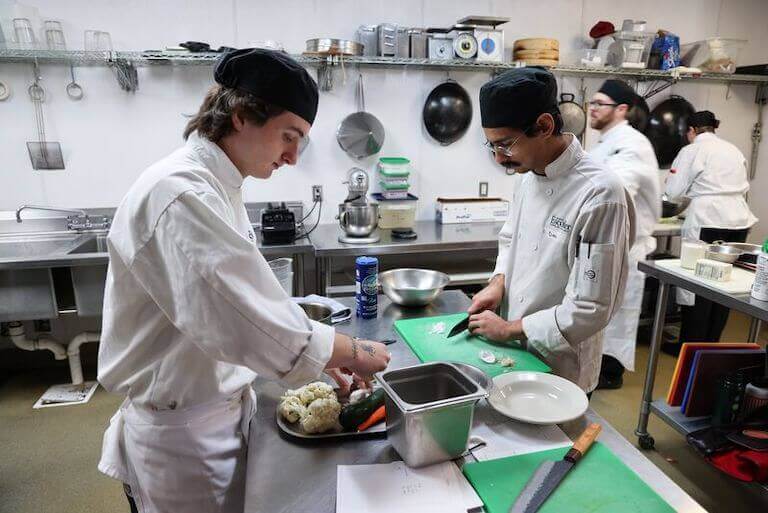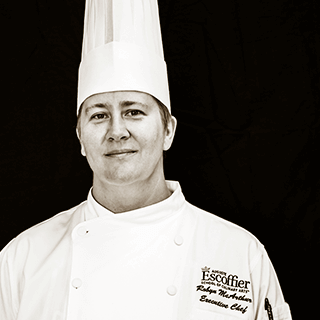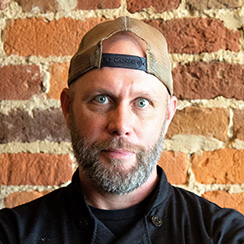Listen to This Article:
You’re focused on a culinary career and weighed your options, perhaps looking into everything from a job in a high-end restaurant to a side hustle on TikTok—and you’ve realized that culinary school is the best place for you to start or advance your career.
After all, culinary school can be a great option for many serious-minded aspiring chefs and foodies. It could provide you with solid foundational culinary skills, hands-on experience in a kitchen or foodservice establishment, networking opportunities, and even business acumen — all in potentially less time than other approaches.
But how do you know which culinary school is the best match for you? Here’s a detailed guide that may help you choose a culinary school.
Where Do You Want Culinary School To Take You?
It’s important to know what you want before evaluating whether a school fits your needs. When you’re clear about your vision, you can make sure your school is part of the path to get there.
Start by considering your ultimate goal and then working backwards. For example, if you want to be a head chef, what does that look like? What, exactly, does the role entail and what would your responsibilities be? Then, reverse engineer the steps and hierarchy to figure out what you need to do to get there.
In this case, a head chef probably started with culinary school, then participated in an internship or externship, and then found a job at a restaurant. They might have advanced from prep cook to line cook to sauce chef to sous chef before finally working their way into a head chef position.
Of course, hospitality extends far beyond the kitchen. Would you like to be customer-facing or work in the back of the house? Do you like to coordinate events, to be in charge of logistics? Or does travel, even something like working on a cruise ship, appeal to you? Culinary school can prepare you for careers that suit your desires to a T.
Understand What Culinary School Is and Isn’t
Naturally, culinary school can be a great place to go if you plan to become a chef … and it can also be a great place to go if you don’t plan to become a chef. Areas of study run the gamut from culinary arts foundations to entrepreneurship to Hospitality and Restaurant Operations Management.
In other words, culinary school might be a fit whether you want to become a head chef at a Michelin Star restaurant or you want to organize activities aboard a cruise ship.
Although you can earn a degree or diploma, culinary school often isn’t like a traditional college—instead, it’s typically referred to as a trade school. And this can be great for aspiring chefs and business owners, because, while a college or university usually offers a generalized education, culinary school is highly specialized. It is designed to prepare students for a career in a specific trade.
Escoffier considers itself a culinary trade school whose skills-based programs can offer students leading-edge classwork as well as real-world experience and opportunities via industry externships. You could complete your education in a shorter timeframe than many colleges and potentially at a lower cost.
Like any school, you may encounter challenges along the way. Culinary school includes new terminology and techniques, and it can at times be technical and complex. Students need to have good time management skills and a dedication to their studies as well as good communication with Chef Instructors.
The rewards at the end can include solid industry knowledge and connections as well as the satisfaction of setting and achieving goals.
Evaluate the Cost and Return on Investment
Dreams are an essential part of your path, but it’s also important to ground yourself in the realities of your investment and understand what you want to get out of culinary school. Take some time to evaluate the investment of time and money you’re willing to spend on your education.
Escoffier is transparent in its pricing; all of the fees and costs you are quoted will not increase for the duration of your program. And our financial aid team can describe the aid available to you if you apply and qualify, plus direct you to the forms and documentation you’ll need to apply. Refer to our tuition page for up-to-date pricing information.
You can find out your net price and team up with our financial aid office to figure out how to make culinary school work for you. Each student receives an estimated net price after completing the Free Application for Federal Student Aid (FAFSA®) form.**
**Financial aid is available for those who apply and qualify. International students are not eligible for aid. Note that online programs also require a computer, tablet, or mobile device in order to participate.
Make a Plan to Pay for Your Education
If you don’t already have a working knowledge about budgeting, now is a good time to start.
Make a plan that includes tuition and fees and living expenses, and be sure to evaluate your current situation as well as how life might look when you’re in school; for example, will you be able to balance school and a job, and do you have a firm grasp on your needs versus your wants?
Look for Financial Aid, Scholarships, and Grants
You want to make sure your education is an investment, not an expense you’ll be saddled with for years on end.
Financial aid is available to those who apply and qualify. Familiarize yourself with the process and the vocabulary—the research can potentially save you a significant amount of money and make the whole process less stressful.
Assessing the Cost of Culinary School? Start Here!
If you’re considering the cost of culinary school, here’s an at-a-glance look at the range of costs for diploma and degree programs at Auguste Escoffier School of Culinary Arts.
- Diplomas in Culinary Arts (online, Boulder, or Austin): $19,569 – $23,272
- Associate Degrees in Culinary Arts (online, Boulder, or Austin): $35,145 – $39,365
- Pastry Arts Diplomas (online, Boulder, or Austin): $19,569 – $22,253
- Associate Degrees in Pastry Arts (online, Boulder, or Austin): $32,445 – $39,365
- Plant-Based Culinary Arts Diplomas (online or Boulder): $23,272 – $25,959
- Associate of Occupational Studies Degree in Plant-Based Culinary Arts (online only): $35,145
- Diploma in Food Entrepreneurship (online only): $23,272
- Associate of Occupational Studies Degree in Food Entrepreneurship (online only): $35,145
- Diploma in Holistic Nutrition and Wellness (online only): $23,272
- Associate of Occupational Studies Degree in Holistic Nutrition & Wellness (online only): $35,145
- Associate of Occupational Studies Degree in Hospitality and Restaurant Operations Management (online only): $34,770
All listed program costs are as of December 2024. For the most up-to-date information, see Total program costs.
Note that online programs also require a computer, tablet, or mobile device to participate. Students may provide their own or pay an optional $250 Technology Fee for a Google Chromebook.
Look For a School With a Proven Track Record
As you evaluate culinary schools, look for one that gets results. To do this, it helps to know a little culinary school history.
The first culinary school in the U.S. was the Boston Cooking School, founded by Fannie Farmer in 1879 to help women make money as cooking teachers. But it would take another 100 years for formal culinary education to take hold.
The American Culinary Foundation was formed in New York in 1929 with the goal of “promoting the professional image of American chefs worldwide through education of culinarians at all levels.” Throughout the 1930s and 1940s, the ACF developed training and standards for chefs. By the 1970s, it launched the National Standards of Culinary Apprentice programs, which established core competencies for chefs, trainers, and instructors.
After that, interest in culinary school boomed. Auguste Escoffier School of Culinary Arts was founded in 2010 with a mission to honor the legacy of its namesake, Georges Auguste Escoffier, who developed mise en place, codified a formal kitchen hierarchy, and was generally renowned as the “king of chefs and chef of kings.”
Consider the School’s Philosophy
When doing your research, consider a school’s guiding principles, values, and beliefs, and whether they align with yours.
Escoffier’s vision is, “To lead and set standards for the world of food and hospitality, one learner at a time.”
Its mission: “To cultivate passion and lifetime careers in food, hospitality and health by offering affordable, accessible and socially minded education and opportunities to learn.”
Escoffier also lists seven core values:
- Lead responsibly
- Bring the passion
- Stay curious and boldly challenge convention
- Be the best
- Deliver “WOW” service to all customers
- Embrace accountability
- Be humble
The school melds traditional methods and instruction with more recent innovations and approaches. For example, many culinary schools today don’t offer coursework focusing on sustainability, which is why the Farm To Table® program at Escoffier is such an integral part of the school’s philosophical approach. Students can dive into sourcing clean ingredients and integrating organic food into menu design.

Look for a culinary school that can best help you meet your goals.
Reputation Counts: Seek Out a School with Distinction
After you invest time and money into a school, you want to make sure that degree or diploma carries some weight in the outside world.
Escoffier is the No. 1-ranked culinary school in the U.S. by Chef’s Pencil, and its Boulder, CO and Austin, TX campuses are ranked by Niche at numbers 1 and 2, respectively, among colleges for culinary arts. Escoffier is also the largest culinary school brand in the U.S., based on comparable student population data for Austin and Boulder as reported in the Integrated Postsecondary Education Data System.
*Information may not reflect every student’s experience. Results and outcomes may be based on several factors, such as geographical region or previous experience.
Look for a Comprehensive Yet Practical Curriculum
When evaluating culinary school curriculums, it’s important to make sure a school provides general instruction in a variety of topics and also has something deeper to offer those students who want to specialize. No matter your career path, a well-rounded education with a solid foundation can be crucial.
A comprehensive curriculum is one that offers a thorough instruction on foundational principles and also covers ground that can take students deeper into their chosen fields.
For example, students at Escoffier can acquire technical, professional, and some business skills in the various Culinary Arts programs. Escoffier students may receive instruction on cooking methods, financial concepts, professional communication, and world cuisines, and they can get real-world experience via a hands-on industry externship.
What Can I Study at Escoffier?
Escoffier offers degrees or diplomas in six areas of study:
Make Sure the Faculty is Experienced
In culinary school, practical application is a must; look for a school with instructors who don’t just bring theory to the classroom, but who have real-world experience. Be sure you’re receiving instruction from teachers who know what life is really like in a professional kitchen or business, and that they can also communicate that information clearly to students.
Escoffier’s 100-plus Chef Instructors have owned restaurants, cooked in top-tier kitchens, and more.
Find Out Whether a Proven Online Program Is Available
Many prospective culinary students want a degree or diploma but are unable or unwilling to relocate to attend school. Work and family obligations, travel restrictions, cost, and other factors are all legitimate concerns—which can make an online program a necessity in today’s world.
An online program in a culinary school? Not only is it possible, but it’s a must for many students. And the format allows a school like Escoffier to reach more aspiring students than it might otherwise.
Online degrees and diplomas are functionally the same as on-campus degrees and diplomas. That means online graduates may be qualified for the same roles as their on-campus counterparts.
Several Escoffier programs are available on-campus and online. Escoffier’s online programs feature much more than pre-recorded classes. The online culinary school curriculum can include live course lectures and archived sessions, pre-recorded and live cooking demonstrations, assignments, and personalized feedback from Chef Instructors.
The online curriculum also includes hands-on industry externships so students get real-world experience in addition to the classwork they complete in their own kitchens.
Online students can expect to spend about 15-23 hours per week on school-related activities, depending on the program, credential, and personal pace. Most online programs take 60 weeks to complete. Three programs—the Associate of Occupational Studies Degree in Plant-Based Culinary Arts, the Associate of Occupational Studies in Food Entrepreneurship, and the Associate of Occupational Studies Degree in Holistic Nutrition and Wellness—are 84-week programs.
*Information may not reflect every student’s experience. Results and outcomes may be based on several factors, such as geographical region or previous experience.
Make Sure You Can Get Real-World Experience, Too
The best classroom instruction in the world can only get you so far. Hands-on experience is a critical component to ensuring you get the most from a culinary education.
At Escoffier, students are required to successfully finish one to two industry externships—in-person experiences—as the culminating element of their curriculum prior to graduation. Externship experience differs among students but is typically aligned with students’ career goals.
Some students find an externship close to home, while others travel.
Escoffier Culinary Arts graduate Oscar Beltran did his externship at Los Caporales, a fine-dining Mexican restaurant at the Moon Palace Resorts in Cancun. He helped a team member with the mise en place and breakfast service, then prepped for dinner. During his externship, Oscar blossomed from a nervous 19-year-old who didn’t know the area to an award-winning chef—he competed in and won a resort competition among onsite staff to create the best taco al pastor recipe.
Some students might also participate in a stagiaire or a short stint that’s an outgrowth of a traditional apprenticeship. During a stagiaire (pronounced “sta-zhjer”), a cook spends a period of time working in a kitchen, usually without pay; it could be to prove their mettle during a job tryout or to gain some experience for their resume. A stagiaire, or stage (“stazh”), can be as short as a single shift, or as long as several months.
Accreditation is Important for Any Culinary School
Why should you care whether a culinary school is accredited? Because it provides a quantifiable amount of credibility and assures you of a school’s high standards. A school that is accredited has met quality standards as defined by a third-party agency.
Your ability to receive financial aid could also depend on accreditation. According to the federal Department of Education, “In order for students to receive federal student aid from the U.S. Department of Education…for postsecondary study, the institution must be accredited by a ‘nationally recognized’ accrediting agency.”
Escoffier’s Austin campus is nationally accredited by the Council on Occupational Education (COE), and the Boulder campus (which includes online programs) is nationally accredited by the Accrediting Council for Continuing Education and Training (ACCET).
Austin is approved and regulated by the Texas Workforce Commission-Career Schools and Colleges and is authorized as an Associate of Applied Science degree–granting institution through the Texas Higher Education Coordinating Board. Programs are accredited by the American Culinary Federation (ACF) Educational Foundation Accrediting Commission.
The Boulder campus—through which the online programs are available—is approved and regulated by the Colorado Department of Higher Education (CDHE), Division of Private Occupational Schools. Escoffier has been approved by CDHE to participate in the National Council for State Authorization Reciprocity Agreements (NC-SARA).
The Diploma in Pastry Arts, Diploma in Culinary Arts, and Associate Degree in Culinary Arts (residential only) programs are accredited by the American Culinary Federation (ACF) Educational Foundation Accrediting Commission.
Escoffier is also a member of various professional organizations, including the International Association of Culinary Professionals (IACP); the World Association of Chefs Societies (WACS); the National Restaurant Association (NRA); and StateFoodSafety is an online food safety education company dedicated to educating the public about food safety and helping ensure the health of communities nationwide.
Evaluate Student Support Services
Culinary school involves a lot of information in a condensed period of time, so it makes sense that students will need to ask for help sometimes (or often). You want to be sure your chosen culinary school can support you.
Escoffier offers plenty of help, from career counselors to Success Coaches and Chef Instructors. Online students are assigned a Success Coach for their entire enrollment at Escoffier. The coach reaches out to the student after they begin their classes and schedules follow-up appointments to keep track of students’ progress. They are also in regular communication with Chef Instructors, who may contact a Success Coach to let them know when a student appears to need assistance. Residential students have access to similar help through Student Success Managers who visit classes to introduce themselves.
Search For Success Stories
A lot of places can look good online and in the way they describe themselves, but do the culinary school’s results match its hype?
Escoffier has successfully helped thousands of graduates embark upon careers with thousands of employers. And those graduates were students from a wide variety of backgrounds and circumstances. Consider a handful of them:
- Michael Fields went from a frustrating dek job to the sweltering barbeque pits of Texas…and he’s never been happier!
- Discover how Escoffier Chef Instructor Stephen Nalls built an agricultural haven a stone’s throw from the school’s Boulder campus.
- Trenin Nubiru made a career shift from a military engineer to pastry artisan.
After a devastating injury cost her a ballet career, Morgan Banno discovered a new passion: culinary arts.
Find more inspiration on the Success Stories section of our website.
Check Out the School’s Industry Connections
A top-of-the-line curriculum is great, but do students also have access to connections that can help them put that education to good use? The answer is yes at Escoffier.
Escoffier’s Career Services team provides coaching and counseling throughout your experience. You can get help with your resume and portfolio, practice your interview skills, and plan your career. When you’re ready, you can use EConnect to search for jobs and career opportunities with our industry partners. Some of Escoffier’s featured employers include Four Seasons, Hilton Hotels, Whole Foods, Xanterra, Sodexo, Soho House, Chefs for Seniors, Omni Hotels & Resorts, and more.
Escoffier is also a great place to network and build lasting relationships and connections. We have thousands of alumni all over the world and an active alumni association.
Visit the Campus and Its Facilities
What feeling do you get when you walk the grounds of the campus (or when you click around a school’s website)? Is it professional yet welcoming?
Escoffier has two campuses: one in Austin, Texas, and another in Boulder, Colorado. The online program is available through the Boulder campus.
Austin is ranked in the top ten Best Cities for Food in the U.S., according to Food & Wine. Its campus is located near the North Loop, a neighborhood of funky shops and restaurants popular with college students and staff. It’s also about 10 minutes from the University of Texas.
The Boulder campus is set in the foothills of the Rocky Mountains, less than an hour from Denver. U.S. News & World Report named Boulder the No. 10 Best Place to Live in the U.S.
While Escoffier’s campuses are beautiful, they’ve got more than looks; the facilities are also excellent. You can take a tour of our Austin kitchens virtually, check out a video tour of the Boulder campus, or schedule a personal tour.
Find Out How to Apply
Make sure you understand all the steps involved in applying for culinary school, as well as any prerequisites. You don’t have to go it alone; we have plenty of help available and are eager to answer your questions.
Escoffier’s online application process is convenient and user-friendly: you can apply online in around 10 minutes at any time (there is no application fee). Then, an Admissions representative will get a hold of you to complete an admissions overview and discuss further steps needed to complete your application.
The three-step process includes:
- Send in your application by applying online. Once we receive your application, an Admissions representative will contact you to complete an admissions overview and discuss further steps needed to complete your application.
- Submit the required admissions forms. These include, among others, proof of high school graduation (a high school or college diploma, professional degree, G.E.D., or other high school equivalency) and a copy of a valid driver’s license, passport or photo I.D.
- Submit financial planning documents. Escoffier’s Student Finance department staff will help you investigate all of the available financing options for our affordable programs.
***Consider your situation and resources to determine what is affordable and on-budget, for you.
A Great Culinary Education is Within Reach
Your decision about culinary school is an important one, and you want to be sure you’ve found the right fit. Getting clear about your goals, evaluating a school’s credentials and approach, and taking stock of your ability and willingness to invest time and money into your education are all vital steps.
With six different programs including Culinary Arts, Baking and Pastry, Hospitality & Restaurant Operations Management, Holistic Nutrition & Wellness, Plant-Based Culinary Arts, and Food Entrepreneurship—Escoffier can prepare you for a wide range of culinary careers. Check out our various degree and diploma programs to find what works for you.
We know you probably have lots of questions! Contact our admissions department to find out more.
TO FIND OUT MORE ABOUT CULINARY SCHOOL, CHECK OUT THESE ARTICLES:
- How Long Can It Take to Become a Chef?
- What are the Types of Culinary Degrees and Diplomas?
- 10 of the World’s Most Famous Female Chefs
*Information may not reflect every student’s experience. Results and outcomes may be based on several factors, such as geographical region or previous experience.




